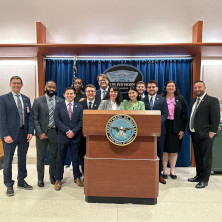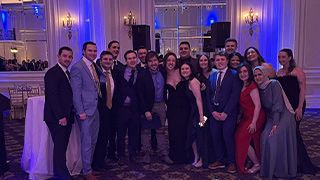NSF Project Enhanced with Data Anal
Wednesday, June 14, 2023

For this year's project, the NSF team focused on how SOCCENT could counter Russia and China’s influence within the Central Asian states by looking at four lines of effort: strategic messaging, defense, culture, and economics. The team struggled to decide how to best translate their research into data. Based on the available data the team could access, they eventually decided to quantify the strategic messaging section and determine the positive or negative sentiment of Russian/Chinese influence in each of the Central Asian states.
Students worked with FNA to collect data on social media engagement within the Central Asian states. FNA combined ACLED data (threat events), GDELT data (all news articles dealing with sentiment), and Twitter data via NLP (natural language processing) machine learning to discover relevant topics, casualty/regression models, and other algorithms to determine a result. The statistical modeling found that over a 12-month period, of the 20,000 international social media participants and 34,000 engagements, only 283 members in 67 audiences were influential on a weekly basis. One Twitter handle was discovered as the most influential person in the Central Asian states when it came to driving positive or negative sentiment about Russian or Chinese influence. In their brief to SOCCENT, the NSF team presented the joint research done with FNA and emphasized the markets SOCCENT should focus on to have the most influence against great power competitors.
For the past six years, the NSF team has provided vital research to one of the key U.S. agencies: the Department of State, the Department of Defense, or the White House. The students complete an operational research paper recommending solutions to some of the U.S. government's most challenging foreign policy problems. Data modeling has greatly enhanced the students' recommendations by providing empirical applications. The partnership with FNA has also increased the experiential learning opportunities of the National Security Fellowship as the partnership teaches students about the emerging world of open-source intelligence and information gathering.
Click here to learn more about the School of Diplomacy's National Security Fellowship.
To learn more about the School's partnership with FNA, click here or visit their website here.
Categories: Law





